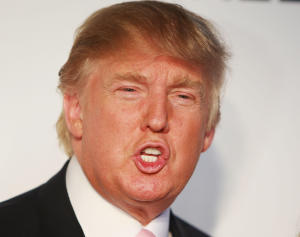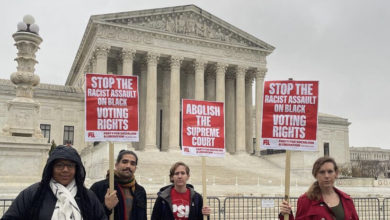Donald Trump, loud-mouth-in-chief, has recently been in the news for some of his earliest comments as a Presidential candidate. Most notably Trump launched a jeremiad filled with derogatory and entirely false information about Latin American immigrants. The comments themselves are so offensive and absurd they do not bear repeating, and in fact the comments themselves are somewhat beside the point.
Donald Trump is playing one of the most notable roles in American bourgeois politics, that of the populist demagogue who plays on people’s deepest fears while holding out the promise of a clearly fanciful future prosperity. We have seen this movie many times before, from Populist leader Tom Watson to Father Coughlin and George Wallace. Such demagogues present with a combination of intense racism with strong acknowledgement of economic malaise along with stinging rebukes against sitting politicians (and occasionally, to lesser and greater degrees, the wealthy).
Trump, in typical fashion, does not easily fit the traditional “left-right” spectrum, borrowing from the right a hard-line against immigrants and from the left massive public works programs. He threatens to unleash military might, or at least the threat of total destruction, to force China and anyone else into submission—over what exact issue, who knows. Trump goes on and on about his business prowess and how that will help him restore America’s economy. On the final score, Trump is joined by Mike Huckabee and Ted Cruz in making absurdly grandiose claims about the return of 1950s-like prosperity (but not tax rates).
In a nutshell, Trump’s campaign isn’t about facts, nor is it hurt by essentially being a work of fiction. It, like most works of fiction, is designed to elicit a purely emotional response and translate that into votes. Trump recognizes that there is a tremendous amount of anxiety over the broad changes in society. The general Republican strategy has been based on this anxiety about the deteriorating economy, which is clearly the number one concern of most people who vote, as well as the broad demographic changes that have seen the nation become less white and much less hostile to LGBTQ people living openly.
The right has tried to tap into this anxiety and fear without saying anything that would anger the billionaire class, in other words without proposing anything other than total free-market fundamentalism. As a capitalist himself, Trump is not bound by any need to make his own class happy in order to receive their bribes (donations), so he dispenses with the right-wing orthodoxy and tacks on a Keynesian idea or two while giving full-throated justification for all sorts of bigotry and jingosism. Vote for Trump and everything will be like “it used to be”—with a booming economy, all international conflicts and rivals under “our thumb,” and a turn away from “alien” influences. In other words, the lily-white suburban American Dream will become reality again—really for the first time since it was always a myth.
Unsurprisingly, these pronouncements have fueled Trump elbowing his way right up near the top of the Republican field. Of course, the pundits claim it’s purely because of his “name recognition,” which is absurd given that many candidates undoubtedly known to the early-state voters are doing fairly poorly. Clearly, Trump is doing well because his message resonates with the fears and hopes of a variety of people in various classes who feel discontented with the status quo and are thus susceptible to the myths of an earlier, seemingly more prosperous time.
Racism and American exceptionalism are the central pillars of the myths of those time. The former, of course, is rarely mentioned in polite company. Trump is succeeding by tapping into those deep wells of racism and belief that “American might” can lead the world into a better place. While it is in no way fact based, his message seems to comport with a sense of reality: “Many things are changing; the economy is tanking and therefore the change has not been for the better. Thus ‘change’ hasn’t really been that good and maybe we should stop it—or at least slow it down.”
Unhinged by the economic orthodoxy of the right, Donald Trump is actually taking space away from the other populist demagogues Ted Cruz and Mike Huckabee, who have been forced to actually defend Trump to shore up their base with people who hate both Latinos and enjoy bombing things. But they are unable to capitalize on the desire of many of those people for a more robust government intervention to right the ship economically.
Donald Trump is the purest embodiment of the Republican strategy since 2008, which has been to use a thinly veiled racism along with outright bigotry on LGBTQ and women’s issues dressed up as First Amendment concerns, to mobilize a dwindling sector of the electorate that is white, male and living in a non-major coastal city. This sector tends to be more conservative on all these questions and is disquieted enough about the economy to take Republican prescriptions for it at face value. Trump broke the mold by simply recognizing that the economic issues are where the Republicans were weakest and by promoting the same bridge and port-building program as Bernie Sanders.
Donald Trump’s rise is an old story, a showman taking advantage of a tumultuous time for his own gain. What is actually worrisome is that someone else could use a similar program to organize a truly dangerous movement. While we should be careful not to overdraw this point, it was a similar primordial soup that made possible Hitler’s rise.
We are in a serious moment where reactionary forces are clearly on the back foot but still retain much more power than organized progressives. The marriage equality ruling, the Black Lives Matter movement, along with a continued push for immigration reform offer a chance for reactionary forces to capitalize on the backlash against these progressive reforms. Donald Trump is giving a cartoonish voice to this, but it can become very serious, very quickly with a serious leader. Isolating and denouncing Trump has to be a key part of a progressive agenda over the coming election cycle.







